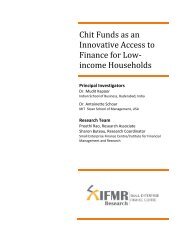Government of India Volume I: Analysis and Recommendations
Government of India Volume I: Analysis and Recommendations
Government of India Volume I: Analysis and Recommendations
Create successful ePaper yourself
Turn your PDF publications into a flip-book with our unique Google optimized e-Paper software.
Table <strong>of</strong> <strong>Recommendations</strong> 11.2 The monetary policy committee<br />
MONETARY POLICY<br />
1. The MPC will be chaired by the Chairperson <strong>of</strong> the central bank. It will have one executive member <strong>of</strong> the<br />
board <strong>of</strong> the central bank <strong>and</strong> five external members.<br />
2. External members will be independent experts in the field <strong>of</strong> monetary economics <strong>and</strong> finance. These members<br />
will be appointed by the Central <strong>Government</strong>, where in case <strong>of</strong> two <strong>of</strong> these members, the appointment<br />
will be in consultation with the Chairperson.<br />
3. The external members will extensively engage with the organisation <strong>and</strong> have access to data (except data on<br />
individual financial firms that is related to the supervisory process), research <strong>and</strong> other <strong>of</strong>fice facilities. However,<br />
they will have no management or operational role within the central bank. They will not be members<br />
<strong>of</strong> the board or any <strong>of</strong> the two advisory councils (described ahead). Their only function in the central bank is<br />
to be members <strong>of</strong> the MPC.<br />
4. The MPC will meet periodically <strong>and</strong> vote on all instruments <strong>of</strong> monetary policy. The main briefing report <strong>of</strong><br />
the central bank’s research department to the MPC would be released to the public one day before the MPC<br />
meeting.<br />
5. A representative <strong>of</strong> the Central <strong>Government</strong> would participate in the MPC meetings, but would not have a vote.<br />
The representative would express the views <strong>of</strong> the Ministry <strong>of</strong> Finance <strong>and</strong> these views would be released into<br />
the public domain.<br />
6. Decisions <strong>of</strong> the MPC would be made on a one-person one-vote basis.<br />
7. Each <strong>of</strong> the seven members will also submit a rationale statement about his/her vote. With a lag <strong>of</strong> three<br />
weeks, the voting record <strong>and</strong> all seven rationale statements would be released into the public domain.<br />
8. The central bank Chairperson would have the power to override the MPC in exceptional circumstances. However,<br />
he/she would be required to release a rationale statement in public, explaining the reasons for disagreeing<br />
with the MPC.<br />
11.4. The monetary policy committee<br />
The Commission recommends the creation <strong>of</strong> an MPC that would determine the policy<br />
interest rate. In addition to the Chairperson <strong>and</strong> one executive member <strong>of</strong> the board,<br />
the MPC would have five external members. Of these five, two would be appointed by<br />
the Central <strong>Government</strong>, in consultation with the Chairperson, while the remaining three<br />
would be appointed solely by the Central <strong>Government</strong>. These members must not be employees<br />
<strong>of</strong> the <strong>Government</strong> or the central bank or be involved in political activity. They<br />
may be permitted to hold other <strong>of</strong>fices or positions during their tenure as MPC members,<br />
subject to there being no conflict <strong>of</strong> interest. In order to avoid conflict <strong>of</strong> interest, external<br />
members should: (a) be restricted from certain activities or affiliations outside the central<br />
bank – these may include restrictions on involvement in financial institutions; <strong>and</strong> (b) not<br />
have allied commercial interests that may give them unfair advantage due to access to<br />
privileged information obtained in their capacity as members <strong>of</strong> the MPC.<br />
MPC members would have access to relevant information within the central bank,<br />
other than information about individual financial firms that is related to the supervisory<br />
process. The members would interact with the research department on an ongoing basis.<br />
This would provide the members with a complete information base required to vote on<br />
monetary policy decisions.<br />
This arrangement, which has been adopted in the monetary policy process worldwide,<br />
has many strengths. A formal voting structure, coupled with the release <strong>of</strong> the voting<br />
record <strong>and</strong> rationale statement, ensures that each member analyses the questions<br />
<strong>and</strong> arrives at his/her own judgement; <strong>and</strong> ensures that it diminishes the extent to which<br />
an individual can dominate the MPC meeting.<br />
Monetary policy faces a challenge in terms <strong>of</strong> the dangers <strong>of</strong> political interference,<br />
particularly in the period prior to elections. The political leadership may <strong>of</strong>ten try to pressure<br />
the head <strong>of</strong> the central bank, asking for accommodative monetary policy. By placing<br />
the decision clearly in the h<strong>and</strong>s <strong>of</strong> the MPC, there is no one person that can be pressured.<br />
A representative <strong>of</strong> the Central <strong>Government</strong>, would participate in MPC meetings but would<br />
not have a vote.<br />
106 FINANCIAL SECTOR LEGISLATIVE REFORMS COMMISSION



